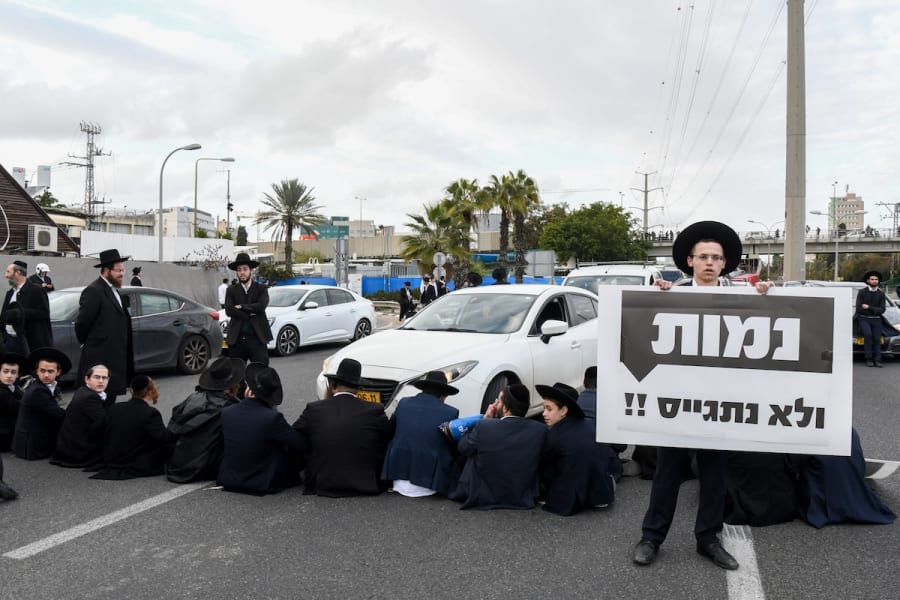A history of the controversial IDF Draft law for eligible ultra-Orthodox religious Jews

Israel’s government might fall, and it might happen soon.
If so, it won’t be due to the current war against Hamas, international pressure for a ceasefire in Gaza, or even corruption allegations against the leader of the Jewish state.
If the government falls anytime soon, it will most likely be due to the ultra-Orthodox military conscription issue – a debate that threatens to destabilize the government led by Israeli Prime Minister Benjamin Netanyahu.
The enlistment of eligible, ultra-Orthodox men in the IDF (Israel Defense Forces), has plagued Israeli society for decades.
The legal deadline issued by the Israeli High Court of Justice happens to be this Sunday, March 31. The court has already issued a dramatic ruling that the state must stop funding for ultra-Orthodox students eligible for the military draft. And all this by sheer coincidence, is taking place in the throes of a difficult war between the IDF and Hamas terrorists in Gaza. It is further complicated by the backdrop of the last few years of political turmoil within Israel regarding the judicial system overhaul.
Will this cocktail of circumstances be enough to bring an end to an already fragmented government? Indeed, it might well be, especially as the courts stand on the brink of announcing their pivotal decision.
Let’s take a brief look at the history of the contentious IDF Draft Law and the profound impact it has on the socio-political fabric of Israel.
Haredi, or ultra-Orthodox, yeshiva students currently get a ‘pass’ by the government from conscription into the army. Officially speaking, their enlistment is “postponed” as long as they study in a yeshiva (Jewish religious education institution) and do not work for a living. For this reason, they often stay in a yeshiva at least until they can get a full exemption from army service, which is currently set at the age of 26.
But as the nation of Israel remains under threat, and all other eligible Israelis serve and risk their lives, many in Israel say it is not fair that tens of thousands of yeshiva students get to skip army service every year. The temporary law that allowed the arrangement has now expired, making the yeshiva students “deserters” – at least on paper – and the Israeli Supreme Court has given the government until March 31 to explain why the issue is not resolved. How did this all begin and why is it still an issue after 75 years of Israel’s statehood? To answer the question, we’ll need to go back to 1948.
When Israel was established as an independent nation in 1948, the country's first prime minister, David Ben-Gurion, agreed to exempt 400 yeshiva students per year but not more. In 1968, the number increased to 800 as the population increased. After the political earthquake of 1977, when the Likud party under Prime Minister Menachem Begin took control, the number of exemptions expanded dramatically as this was one of the conditions for the ultra-Orthodox parties to join his government.
From 1977 until the end of the 1990s, there was no specific law, but the issue was handled directly by Israel’s defense minister through decrees.
In 1998, the Supreme Court issued a verdict that the minister of defense could no longer rule on the matter through decrees and that the government must pass a law on the matter.
It took a few additional years, but the government passed a temporary law in 2002 that would remain in effect for five years. Known as the “Tal Law,” it was basically a way for the Israeli government to keep the status quo but slowly implement changes that would encourage military conscription – using carrots and financial initiatives – among eligible ultra-Orthodox yeshiva students.
Those opting out of military service were required to present proof of their yeshiva studies each year to receive a stamp exempting them for another year. The law aimed to incentivize more yeshiva students to serve in the IDF and, unfortunately, it failed quite spectacularly.
In 2007, the Tal Law was renewed for yet another five years but by 2012, the Supreme Court refused to allow its renewal due to its failure. At that time, the total number of yeshiva students who were not serving in the IDF was a whopping 50,000 or more a year.
To resolve the issue, then-Prime Minister Netanyahu – who was serving his second term in office after being re-elected in 2009, convinced opposition leader Shaul Mofaz to join his government to pass a law that would fix the problem once and for all.
The Plesner Committee, officially formed in 2012, was tasked with creating a new framework for universal military and national service, including exemptions for Haredi Jews and Arab-Israeli citizens from mandatory military service. One day before the committee was supposed to file its final report, Netanyahu dissolved the Knesset and went to elections.
In the elections of 2013, the new politician Yair Lapid – who campaigned on a promise to pass a law making military service mandatory for all citizens – rose to become the second largest political party. Netanyahu established a new government with Lapid and Naftali Bennett without the ultra-Orthodox parties and there was hope that perhaps the issue would finally be resolved.
And it was. A law was passed to lower the number of exemptions for yeshiva students, once again with financial carrots, but also criminal charges against those refusing to serve.
But, that Israeli government fell in 2015, and in the new elections, the ultra-Orthodox parties were once again in the government, and succeeded in changing the law. They removed the threat of criminal charges, took away the carrots and the sticks, and basically turned the law into a tool to justify the previous situation that existed: Once again, eligible ultra-Orthodox yeshiva students would not be required to serve in the IDF at all. But there is more to this story…
In 2017, the Israeli Supreme Court canceled the “Haredi Draft Law” as unconstitutional because it broke the principle of equality before the law. But the Supreme Court, in effect, added this: “Hey, I’m not forcing all the Haredim to go to the army tomorrow. I’m giving you a year to get organized. Alright, government? You have one year to get this done.”
It has been a very long year since 2017... seven years, in fact.
About 15 or 16 times, the government asked for an extension. Each time, there was a different excuse. “We’re in the middle of making it. It’s happening soon, don’t worry.” The Court allowed it.
Until 2023.
Because the law from 2013 was supposed to expire after ten years, in 2023, there is no temporary law that can hold up in court. Since July 2023, all Israeli Haredim of military age are technically considered deserters.
For now, there’s no legal basis for yeshiva students to be exempt from military service. Israeli is back to the pre-2002 situation, meaning they are supposed to serve by law but the defense minister doesn’t enforce it.
But didn’t the court declare this situation illegal in 1998? Yes. But the government said that it's okay because this time, it’s not a fixed situation like back in 1977 through 2002, as if to say: “No-no. This time, it’s only temporary until they pass a law, which they are totally going to do until April 2024. Until then, there is plenty of time to devote to crafting a good law on this issue. Besides, what could possibly happen before then?”
October 7th – that’s what.
But war or not, the government still has until this Sunday to explain to the court why they don’t have a law yet. Israeli Attorney General Gali Baharav-Miarais is reluctant to defend the government at this point unless they have a serious and significant law cooking.
And they don’t.
The Haredim are in the government coalition and cannot have a decree that sends yeshiva students to the army be put into law on their watch.
But Benny Gantz, former IDF chief and member of the current war cabinet, is also in the government. Because of his electoral base, he cannot allow a law pass that gives yeshiva students permanent exemption under his watch.
Israeli Defense Minister Yoav Gallant of the Likud party, who is supposed to be the one to propose the law, threw a bombshell the other day when he said he wouldn’t approve the proposal of any new conscription law unless all parts of the government agreed with it, effectively giving Gantz veto power.
Israel finds itself in the middle of a war and the IDF needs more soldiers, and fast. There have been new laws to extend the length of service for everyone. This has led to an outcry: “Why are you asking us to serve even longer and risk our lives, while eligible ultra-Orthodox yeshiva students people are exempt?”
On paper, these are two separate laws that have nothing to do with one another, but together they’ve turned into a serious headache, and this is the main reason Gallant threw the bombshell. He can’t propose a law that makes IDF service longer for current and reservist soldiers while all yeshiva students are technically considered deserters.
It is unclear how Netanyahu plans to get out of it. The government is preparing a rough draft it will present to the court. It would just be a declaration of intentions they claim will become the base of a future conscription law to be presented to the Knesset by the end of June 2024.
It will likely include goals to convince more yeshiva students to enlist, along with a number of economic carrots and sticks. But Attorney General Baharav-Miara wants to show the Supreme Court that there’s a serious and significant law cooking, and she has complained that this is not the case.
Netanyahu needs this rough draft to be vague enough so the Haredim can live with it, but detailed enough so that the courts will give him more time. He is buying time.
The prime minister isn’t trying to solve the issue; all of his efforts are only going to buy time: Time in which he can “temporarily” not enforce the conscription law upon yeshiva students while assuring the funding of yeshiva institutions.
No one actually believes it will be solved in just another two months because, by June, there will be yet another excuse to postpone it. How long will it last? Hard to say. But governments have fallen on this question in the past, and there’s no reason to think it can’t happen again.

Tuvia is a Jewish history nerd who lives in Jerusalem and believes in Jesus. He writes articles and stories about Jewish and Christian history. His website is www.tuviapollack.com














